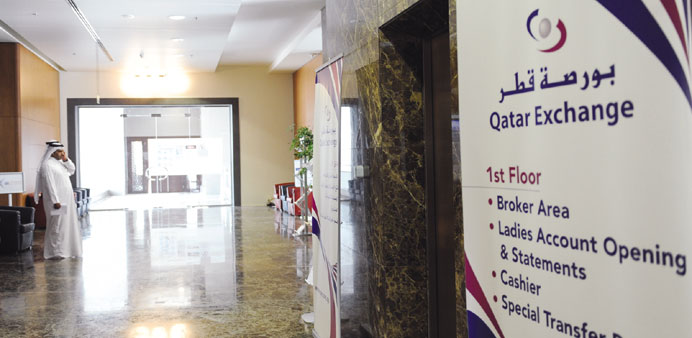More than 83% of the QSE stocks ended in the red yesterday.
By Santhosh V Perumal/Business Reporter
The Qatar Stock Exchange yesterday witnessed heavy profit-booking, especially at the insurance, industrials, consumer goods, telecom and banking counters, and the key index retreated below the 12,700 mark.
As much as QR23bn in capitalisation was wiped off with the 20-stock Qatar Index (based on price data) dropping 1.28% to 12,696.24 points.
Net selling was seen intense among foreign institutions in the market, which is however up 22.32% year-to-date.
However, the index that tracks Shariah-principled stocks was seen losing slower than the other indices in the bourse where trading activities were on the higher side.
Overall, volumes were mainly skewed towards real estate, banking, industrials and consumer goods equities.
The 20-stock Total Return Index shed 1.28% to 18,932.83 points, the All Share Index (with wider constituents) by 1.64% to 3,252.58 and the Al Rayan Islamic Index by 0.89% to 4,199.68.
All the three indices factored in dividend income as well.
Insurance stocks plummeted 2.57%, followed by industrials (2.01%), consumer goods (1.85%), telecom (1.73%), banks and financial services (1.71%) and transport (1.37%); whereas realty gained 1.14%.
More than 83% of the stocks were in the red with major losers being QNB, Industries Qatar, Qatar Islamic Bank, Commercial Bank, Doha Bank, al khaliji, Aamal Company, Ooredoo, Vodafone Qatar, Nakilat, Ezdan, Mazaya Qatar, United Development Company, Mesaieed Petrochemical Holding, Gulf International Services, Doha Insurance, Qatar Insurance, Al Khaleej Takaful, Qatar Islamic Insurance, Salam International Investment, Widam Food and Milaha.
However, Masraf Al Rayan, Qatari Investors Group and Barwa were seen to buck the trend.
Market capitalisation eroded 2.92% to QR754.61bn. Large, micro, small and mid cap equities melted 2.26%, 1.76%, 1.25% and 0.83% respectively.
Foreign institutions’ net selling surged to QR52.15mn compared to QR2.23mn the previous day.
Domestic institutions’ net profit-booking was up to QR49.72mn against QR42.3mn on Sunday.
However, Qatari retail investors’ net buying rose to QR82.6mn compared to QR34.33mn the previous day.
Non-Qatari individual investors’ net buying rose to QR19.13mn against QR10.31mn on Sunday.
Total trading volume rose 29% to 37.1mn stocks, value by 27% to QR1.35bn and transactions by 2% to 12,354.
The real estate sector’s trading volume shot up 75% to 23.21mn equities, value by 74% to QR679.3mn and deals by 37% to 4,597.
The insurance sector saw its trading volume surge 31% to 1.44mn shares, even as value fell 25% to QR44.91mn and transactions by 35% to 473.
The industrials sector’s trading volume expanded 14% to 2.65mn stocks, value by 40% to QR202.08mn and deals by 12% to 2,617.
The telecom sector’s trading volume was up 6% to 1.72mn equities and value by 11% to QR40.46mn, while transactions were down 2% to 626.
However, the consumer goods sector’s trading volume plummeted 35% to 2.43mn shares, value by 19% to QR110mn and deals by 32% to 1,225.
The transport sector saw its trading volume plunge 18% to 1.59mn stocks, value by 19% to QR56.12mn and transactions by 29% to 536.
The banks and financial services sector reported 15% decline in trading volume to 4.06mn equities, 5% in value to QR214.58mn and 10% in deals to 2,280.
In the debt market, there was no trading of treasury bills and government bonds.
Gulf markets close lower
Most stock markets in the Gulf declined yesterday as retail investors booked profits in Dubai, Abu Dhabi and Qatar after strong gains lifted those bourses to multi-year peaks earlier this month.
The three markets are the top performers in the region: Dubai has gained 51%, Abu Dhabi is up 19% and Qatar has added 22%.
“Given the run-up year-to-date, it is natural to see them (retail investors) book a little bit of profit,” said Amer Khan, senior executive at Shuaa Asset Management.
Also, all three markets have been boosted by expectations of increased foreign investment since index compiler MSCI said last June it would upgrade them to emerging market status at the end of May 2014.
But, citing limits on foreign ownership, MSCI told clients at the end of last week that it would cut by half the index weightings of four major stocks from each country. This will reduce passive fund inflows associated with the upgrade - although they were expected to be modest in any case.
Dubai’s bourse slid 0.8% yesterday. Dubai Islamic Bank, down 2.2%, was the main drag. The lender is due to publish its first-quarter results in coming days.
Shares in construction firm Arabtec Holding edged down 0.7% as trading volume decreased after it hit an all-time closing high of 8.99 dirhams on Sunday. The stock has gained 49% this month.
In Abu Dhabi, the index slipped 1.2%, pulled down by large lenders such as Abu Dhabi Commercial Bank and First Gulf Bank, which fell 2.5 and 2.0% respectively.
Egypt’s bourse declined 1.0%, down for a second session in a row after closing at a three-week high last Wednesday. Property developer Talaat Moustafa Group was the main drag, dropping 3.1% as its shares stopped carrying the 2013 dividend on Monday.
Elsewhere in the Gulf, Saudi Arabia’s index edged up 0.01% to 9,576 points; Kuwait’s measure slid 0.06% to 7,422 points; Bahrain’s benchmark rose 0.4% to 1,425 points, while Oman’s index added 0.5% to 6,749 points.

